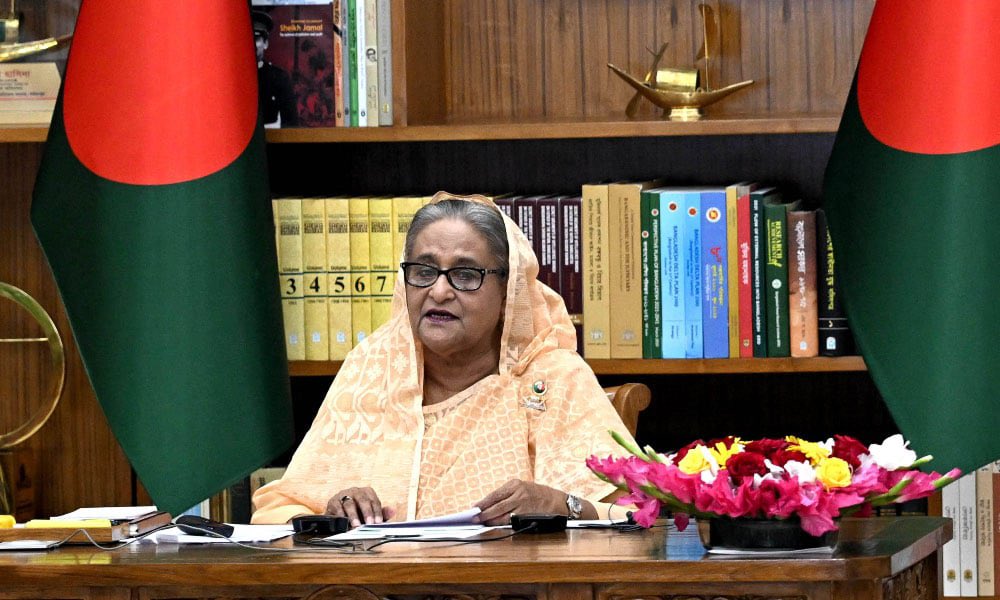Dhaka: Bangladesh Prime Minister and ruling Awami League’s president Sheikh Hasina Wednesday launched her party’s poll manifesto, pledging to build a “Smart Bangladesh” if elected for a fourth consecutive term in the January 7 general elections, being boycotted by the main opposition BNP.
“Come; once again allow us to serve you by voting for the ‘boat’, the election symbol of the Awami League,” Hasina, along with senior party leaders and sympathisers, said while unveiling her party’s poll manifesto in a crowded press conference.
“You vote for us; we will give you development, peace, and prosperity,” Hasina, 76, said, adding that her party does not believe in rhetoric, but implements whatever it promises.
The Awami League coined “Smart Bangladesh: Development is visible, now employment will enhance” as the theme for the manifesto, setting 11 priorities for building a modern, technology-oriented country, and pledges to modernise the healthcare sector with a “universal health system”.
“In the 2008 election manifesto, we announced Vision 2021, which was a charter of change. We successfully ran the country after overcoming hundreds of hurdles by winning the 2014 and 2018 elections,” Hasina said.
Meanwhile, ailing former premier Khaleda Zia’s Bangladesh Nationalist Party (BNP) is carrying out an anti-election street campaign, calling for intermittent strikes and transport blockades, saying no election under the incumbent government would be fair or neutral.
The BNP has also called for civil disobedience against the Hasina-led dispensation, urging people not to pay taxes and utility bills to press its demand for a non-party interim government for election oversight by amending the country’s Constitution.
The BNP is boycotting the election after its demand for an interim non-party neutral government to organise the voting was rejected by the government. The party had boycotted the 2014 election but took part in 2018 polls, which party leaders later said was a mistake alleging that the voting was marred with widespread rigging and intimidation.
Launching the manifesto, Hasina criticised the Opposition, saying, “Whenever the election comes, an anti-liberation, anti-Bangladesh, and anti-development circle becomes active with a leap of conspiracy.”
She said ahead of the polls every time, the Opposition appeared in the political landscape to grab the state power through back doors, and “if unsuccessful, they jump on the people in the spirit of revenge”.
“They want to intimidate the public through arson, vehicle burning, bombing, sabotage, or terrorist activities. This time was no exception,” Hasina said.
Since October 29, the BNP has been holding intermittent nationwide strikes and transport blockades. According to a media tally, 11 people died, 386 vehicles were torched, and four trains were derailed from tracks in the past two months in political violence. Police arrested thousands of opposition activists and figures, including de-facto BNP leader and party secretary general Mirza Fakhrul Islam Alamgir, over charges of violence.
Hasina alleged that BNP is hatching conspiracies from abroad, in an apparent reference to the party’s acting chairman and Zia’s son Tarique Rahman who has taken refuge in the UK to evade jail terms.
Several Bangladeshi courts declared Rahman a “fugitive” as he took refuge in the UK to evade jail terms for several criminal charges, including a grenade attack on a rally of the then-opposition Awami League in 2004 in which 24 people were killed.
Hasina narrowly escaped the attack, which also wounded some 500 of her party leaders, activists, and supporters.
Zia, 79, was also convicted and jailed on two graft charges with a 17-year jail term. However, she is now in a hospital with multiple health issues.
The US and other major Western countries called for dialogue between the ruling Awami League and particularly with the BNP to ensure an inclusive and credible election, which, however, saw no headway due to reluctance from both sides.
With the BNP boycotting the election, and no other credible opposition party against it, Hasina’s Awami League is likely to gain an upper hand and likely to form the government for the fourth consecutive term.
BNP’s boycott of polls had initially exposed the Awami League to a challenge of legitimising the January 7 polls as the Jatiya Party (JAPA), which is officially or technically the main opposition in the current Parliament, was also reluctant to take part in the upcoming elections.
However, earlier this month, Awami League decided to spare 26 out of the 300 parliamentary seats to JAPA in an apparent effort to persuade the party to take part in the January 7 elections in BNP’s absence, while its nominees withdrew their candidature from these seats.
Political analysts opined that the JAPA’s previous stance of unwillingness to contest the polls was a bargaining technique.
Awami League also left six seats to its partners in the 14-party ruling alliance — three seats to left-leaning Jatiya Samajtantrik Dal (JASOD), two to the Workers Party, and one to another Jatiya Party faction called JP.
PTI
